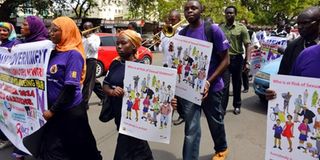State urged to adopt zero-tolerance policy on gender based violence

A march against gender based violence in Nakuru on December 10, 2014. FILE PHOTO | SULEIMAN MBATIAH |
What you need to know:
- The study is meant to establish the prevalence and patterns of gender based violence at the community level in Kenya.
- Physical assault, verbal abuse, rape and domestic conflicts were ranked high in perceptions of forms of gender based violence.
The National Crime Research Centre wants the National Police Service, the Director of Public Prosecutions and the Judiciary to declare a zero tolerance policy on gender based violence in the country.
The call to the state agencies to work together in addressing the issue follows a new study which shows gender based violence reporting remains low despite high prevalence.
Mombasa, Machakos, Samburu, Kisii, Kilifi, Busia, and Meru are the counties worst hit by cases of gender violence including rape, battery and beatings, according to a new report released by the Research Centre.
The victims were mostly women and in some cases, the brutalities meted on them resulted in deaths in areas like Meru, Nakuru, Nyeri, Machakos, Kiambu, Busia, Samburu and Nairobi.
The National Crime Research Centre says there is need to affirm a zero-tolerance policy on gender violence, despite the existence of a law criminalising it.
“While victimisation can be addressed through legal instruments, there is need for greater empowerment of both women and men so as to minimize long-term vulnerability to violence,” the Centre said in a report.
The study, whose findings were released on Friday, is meant to establish the prevalence and patterns of gender based violence at the community level in Kenya.
Physical assault, verbal abuse, rape and domestic conflicts were ranked high in perceptions of forms of gender based violence.
Other forms surveyed included economic abuse, psychological humiliation, deprivation of resources, early marriages, defilement, forced marriages and forced initiation for girls, frustration and sexual assault.
Attorney-General Githu Muigai promised to take legal action to curb the crimes.
He said his office would initiate a framework involving other agencies, noting that gender violence cannot be tolerated in any form, any context, and any circumstances by the government.
The Department of Gender and Social Development has been urged to take the lead role in increasing awareness on gender based violence through the media and advertisements.
According the to the report, failure to report cases of gender based violence and lack of cooperation from witnesses was found to be greatest barrier to prevention and control of the crime.
INCREASE AWARENESS
In its recommendations, the National Crime Research Centre says there is need to increase awareness among community members about gender based violence, including the various forms in which it occurs, causes and appropriate responses.
“Different stakeholders need to roll out programmes aimed at encouraging increased reporting of gender based violence to relevant authorities and supporting prosecution of perpetrators by providing witness evidence,” it states.
The Centre notes in its findings that GBV is generally rooted in socio-economic, cultural and political exclusion of both women and men.
The National Gender and Equality Commission was challenged to utilise findings of the study and partner with relevant state agencies to ensure the zero-tolerance policy on gender based violence is integrated in programming.
The Department of Culture on the other hand has been urged to also bolster its interventions in addressing retrogressive cultural practices such as Female Genital Mutilation, early/forced marriages and beliefs that support a patriarchal society.
The survey was conducted in 13 counties: Nairobi, Mombasa, Kilifi, Machakos, Meru, Kiambu, Nyeri, Nakuru, Samburu, Kisii, Migori, Busia and Vihiga.
Alcohol and drug abuse were listed top among what caused violators to met out violence on their victims.
Others top causes are stress and poverty, interpersonal conflict, male dominance, cultural rite, having no fear for consequences and peer pressure in that order.
One of the researchers, Stephen Muteti, said in cases where the women are violators, it was sometimes in self defence.
“As men use their muscular capacity, the women are using weapons and I think this is so when it comes to self defence,” he said.
Majority of victims who survived violence sustained bruises, cuts, dislocations, sprains broken teeth and burns, among other injuries.
The report was the culmination of interviews with 656 women and 163 men across the country.
The survey also found out that besides family members, victims were also abused by teachers and police officers.
Most cases of violence were reported to the police and others to the provincial administration, parents, religious leaders, workmates and teachers in that order.




